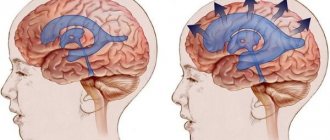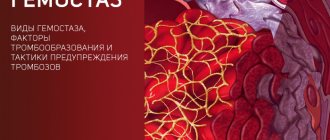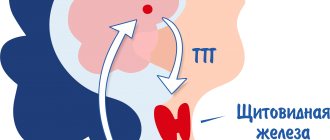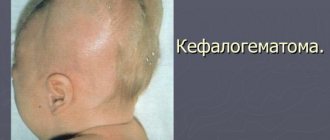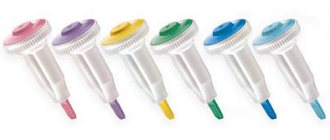Synonyms: ACTH, Adrenocorticotropic hormone, Corticotropin, ACTH, Adrenocorticotropic hormone, Corticotropin,
Scientific editor: M. Merkusheva, PSPbSMU named after. acad. Pavlova, medical practice.
An analysis for adrenocorticotropic hormone is carried out to identify pathologies in the functioning of the endocrine system and adrenal glands.
The hormone is produced by the gland of the brain - the pituitary gland, namely, its frontal part (anterior lobe). ACTH acts on the adrenal cortex, causing the production of hormones necessary for health: androgens, cortisol, estrogens.
Indications for analysis
A test for hormone levels is prescribed for the diagnosis and treatment of diseases associated with dysfunction of the adrenal cortex. Monitoring indicators is also necessary to assess the effectiveness of therapy for oncological pathologies.
In women, ACTH is performed in case of menstrual irregularities, excessive hair growth, and infertility.
What symptoms and activities may be a reason for getting tested:
- abnormal pigmentation of the epidermis;
- acne in adults;
- early puberty in adolescents;
- Cushing's disease (fat deposition on the face, neck, abdomen, purple stretch marks on the abdomen, thinning limbs, increased blood sugar, high blood pressure);
- diseases of the skeletal system (osteoporosis), as well as muscle weakness and pain;
- causeless weight loss accompanied by high blood pressure;
- regular attacks of hypertension;
- severe fatigue, weakness and lethargy for a long time;
- deviation from the norm of cortisol in the blood;
- monitoring the patient’s rehabilitation after removal of corticotropinoma (tumor in the pituitary gland);
- long-term treatment with medications (for example, glucocorticoids);
- dysfunction of the adrenal cortex;
- monitoring the effectiveness of treatment for cancer patients.
For a doctor, the reason for referring a patient to ACTH may be:
- test with corticotropin-releasing hormone;
- changes in cortisol levels;
- suspected ACTH-producing tumor.
4. Risks of analysis and what can interfere with the test?
Risks of ACTH testing
If you take a blood test for ACTH, then possible risks may only be associated with taking blood from a vein. In particular, the appearance of bruises at the site of blood sampling and inflammation of the vein (phlebitis). Warm compresses several times a day will relieve phlebitis. If you are taking blood thinning medications, you may bleed at the puncture site.
What can interfere with the test?
Reasons why you may not be able to take a corticotropin test include:
- Taking corticosteroid drugs, estrogens, spironolactone. Also, the test results can be affected by amphetamines and insulin, after taking which the level of cortisol is increased.
- Alcohol or drug intoxication.
- Pregnancy or menstruation in women.
- Physical or emotional stress.
Corticotropin releasing hormone test
In rare cases, ACTH can be produced not only by the pituitary gland, but also by a malignant tumor in any organ. Tests show high levels of ACTH and cortisol. To diagnose the pathology, a test with corticotropin-releasing hormone is prescribed. After it, the ACTH level either increases (indicating Itsenko-Cushing's disease) or remains at the same level (ectopic production syndrome).
To carry out the test, venous blood is taken in the morning on an empty stomach and ACTH is measured. Then 100 mcg of corticotropin-releasing hormone is injected into a vein and blood is drawn after 30, 45 minutes and 1 hour, determining the ACTH level for each time.
3.How to prepare and how is the analysis carried out?
How to prepare for an ACTH test?
You should not eat, drink, stress, or exercise for 10 to 12 hours before your blood draw.
If the doctor wants to measure the peak level of corticotropin in the blood, then the tests will have to be taken in the morning; if the doctor wants to find out the lowest level, then in the evening.
How is ACTH analysis performed?
An ACTH test is performed after taking blood from a vein. Blood sampling from a vein is carried out according to a standard procedure.
About our clinic Chistye Prudy metro station Medintercom page!
ACTH norms
Standard reference values
The norm for the ACTH test is an absolute value of 9-52 pg/ml.
Reference values of the Invitro laboratory Invitro values are somewhat different from the standard ones, since the more modern equipment of this laboratory allows measurements to be taken with greater accuracy.
- <46pg/ml
Factors influencing the result
- failure by the patient or medical staff to comply with the rules of preparation for the procedure;
- taking medications;
- recent injury or surgery;
- inappropriate phase of the menstrual cycle;
- the patient has a high temperature;
- pregnancy and lactation;
- unstable mental state;
- time zone change;
- sleep disorder;
- hemolysis (destruction) of red blood cells.
Important! The interpretation of the results is always carried out comprehensively. It is impossible to make an accurate diagnosis based on only one analysis.
References
- Nazarenko G.I. Clinical assessment of laboratory research results / G.I. Nazarenko, A.A. Kishkun - M.: Medicine, 2006 - 543 p.
- Allen MJ; Sharma S. Physiology, Adrenocorticotropic Hormone (ACTH) March 3, 2021 URL: https://www.ncbi.nlm.nih.gov/books/NBK500031/ (accessed 01/10/2020)
- Fish S., MD Adrenocorticotropic Hormone (ACTH), October 2019 URL: https://www.hormone.org/your-health-and-hormones/glands-and-hormones-a-to-z/hormones/adrenocorticotr… ( access date 01/10/2020)
ACTH is elevated
Pathology is indicated by a 1.5-fold increase in hormone levels:
- Itsenko-Cushing's disease. It occurs against the background of various pathologies (the most common is pituitary adenoma). Increased iron volume produces more hormone, which means it stimulates excess cortisol production - ACTH increases up to 2 times;
- Addison's disease (cortisol deficiency), as well as congenital adrenal hyperplasia. In these pathologies, the adrenal cortex does not produce cortisol, shifting the function to the pituitary gland. In this regard, the level of ACTH rises sharply; — 2-2.5 times (> 1000 pg/ml);
- paraneoplastic syndrome. It is a consequence of the reaction of the pituitary gland to an oncological formation in any organ;
- Nelson's syndrome. Develops in patients with Cushing's disease, in the presence of a pituitary tumor, after amputation of the adrenal glands. The patient experiences secondary adrenal insufficiency and ACTH levels increase;
- syndrome of ectopic production of adrenocorticotropic hormone - 1.5 times the norm. In rare cases, ACTH can be produced not only by the pituitary gland, but also by a malignant tumor in any organ. Tests show high levels of ACTH and cortisol. To diagnose the pathology, a test with corticotropin-releasing hormone is prescribed. After it, the ACTH level either increases (indicates Itsenko-Cushing's disease) or remains at the level (ectopic production syndrome);
- taking medications. Lithium-based drugs, insulin, ethanol, calcium gluconate, amphetamines, aminoglutethimide, levodopa, metoclopramide, metyrapone, pyrogens, vasopressin can artificially increase ACTH levels.
Preparing for the examination
First of all, it is necessary to choose a laboratory with a good reputation and a high level of trust, since if the research technology is incorrect, the indicators can be underestimated or overestimated, which can lead to serious diagnostic errors. You also need to take into account that the price in different laboratories for ACTH analysis may vary.
ACTH levels are largely dependent on external factors, such as:
- stress factors (excessive physical activity, intense sports);
- strong emotional states (fear, anger, prolonged experiences);
- smoking and drinking alcohol;
- infectious diseases, extensive injuries;
- inadequate thermal effects (hypothermia or overheating);
- surgical interventions.
To obtain the most objective results, blood donation should be done only when the patient is fully confident that for the last 7-8 days his body has not been exposed to any factors that could affect the level of corticotropin. This is important to consider for further correct diagnosis. Therefore, the patient should be aware that it is necessary to begin preparing for the study in advance.
If the patient is constantly taking any medications, then healthcare workers must be notified about this, and the doctor can individually consider the issue of temporarily discontinuing them.
ACTH is low
Insufficient production of the hormone is associated with the following processes:
- secondary hypocortisolism. If the functioning of the pituitary gland is disrupted (insufficient production of ACTH), atrophy of the adrenal cortex occurs (lack of cortisol synthesis). Functional failure of other glands of the endocrine system may also occur;
- Itsenko-Cushing syndrome. The level of adrenocorticotropic hormone falls in the presence of a malignant tumor in the adrenal glands. It differs from Cushing's disease in that there is excessive production of cortisol and, as a result, a reduction in the production of ACTH by the pituitary gland;
- benign formations in the adrenal glands. The tumors in this case perform the function of the organ and produce additional cortisol, which reduces ACTH levels;
- taking medications from the glucocorticoid group, cryptoheptadine.
The role of ACTH in a woman’s body
Functions of ACTH
- Stimulates the formation of protein and nucleic acids in adrenal cells during prolonged exposure to ACTH. This leads to the growth of the adrenal glands and the proliferation of their cortex. Since the adrenal glands produce a number of important hormones (cortisol, sex hormones progesterone, estrogens, testosterone), their proliferation leads to an increase in the concentration of these substances.
- Directly increases cortisol synthesis with short-term exposure to ACTH. The main role of cortisol is to mobilize the body's resources in a stressful situation. Cortisol provides:
- a rush of blood to the muscles, which allows you to use the “fight or flight” reflex during stress;
- increasing blood glucose levels, which is necessary to improve muscle function;
- has an antiallergic effect;
- has analgesic, anti-inflammatory and anti-stress effects.
Negative properties of cortisol
- immunosuppression – reduces the production of lymphocytes and antibodies;
- decreased muscle mass due to increased protein breakdown;
- slow digestion, decreased intestinal motility;
- deterioration of cognitive abilities - thinking, remembering, understanding, learning, motivation.
- Affects the synthesis of mineralocorticoids - hormones that regulate mineral metabolism (aldosterone, deoxycorticosterone). Aldosterone promotes inflammation and affects kidney function by increasing urinary excretion of potassium and decreasing urinary excretion of sodium. These minerals are responsible for the ability of tissues to retain water, increase the amount of circulating blood, and increase blood pressure. Deoxycorticosterone has similar properties, but less activity.
- Activates androgen precursors – dihydroepiandrostenedione and androstendinone. This leads to an increase in the level of male sex hormones and can be manifested by hair growth on the face and body, acne, ovarian dysfunction and menstrual irregularities.
- Increases the synthesis of cholesterol necessary for the construction of cell walls, nerves, the formation of vitamin D, and the protection of red blood cells from harmful influences.
- Has a melanocyte-stimulating effect. Forces melanocytes to produce more melanin pigment, which determines the color of skin, hair, and iris.
- Affects brain cells. Affects memory, motivation, learning processes. ACTH deficiency causes indifference to the environment, depression, memory impairment, and psychosis.
- Interacts with other peptide hormones – they mutually increase each other’s influence on the body:
- prolactin – is responsible for the growth of the mammary glands, the formation of milk in them, the inhibition of the menstrual cycle, and also reduces the level of estrogen; influences the development of secondary reproductive organs;
- somatotropin - if in excess, children can experience active body growth, and in adults it helps remove fat from fat depots (subcutaneous fat) and their oxidation;
- vasopressin - affects vascular tone and blood pressure, increasing the volume of blood in the vessels.
Regulation of ACTH synthesis
feedback
- The hypothalamus analyzes the level of adrenal hormones - corticosteroids.
- The hypothalamus enhances the work of the pituitary gland and the synthesis of ACTH with the help of the hormone corticoliberin.
- ACTH acts on receptors located on the membrane of adrenal cortex cells, activating the synthesis of corticosteroids.
- High levels of corticosteroid hormones are sensed by the hypothalamus and suppress the production of ACTH in the pituitary gland.
The role of ACTH in a woman’s body
Functions of ACTH
- Stimulates the formation of protein and nucleic acids in adrenal cells during prolonged exposure to ACTH. This leads to the growth of the adrenal glands and the proliferation of their cortex. Since the adrenal glands produce a number of important hormones (cortisol, sex hormones progesterone, estrogens, testosterone), their proliferation leads to an increase in the concentration of these substances.
- Directly increases cortisol synthesis with short-term exposure to ACTH. The main role of cortisol is to mobilize the body's resources in a stressful situation. Cortisol provides:
- a rush of blood to the muscles, which allows you to use the “fight or flight” reflex during stress;
- increasing blood glucose levels, which is necessary to improve muscle function;
- has an antiallergic effect;
- has analgesic, anti-inflammatory and anti-stress effects.
Negative properties of cortisol
- immunosuppression – reduces the production of lymphocytes and antibodies;
- decreased muscle mass due to increased protein breakdown;
- slow digestion, decreased intestinal motility;
- deterioration of cognitive abilities - thinking, remembering, understanding, learning, motivation.
- Affects the synthesis of mineralocorticoids - hormones that regulate mineral metabolism (aldosterone, deoxycorticosterone). Aldosterone promotes inflammation and affects kidney function by increasing urinary excretion of potassium and decreasing urinary excretion of sodium. These minerals are responsible for the ability of tissues to retain water, increase the amount of circulating blood, and increase blood pressure. Deoxycorticosterone has similar properties, but less activity.
- Activates androgen precursors – dihydroepiandrostenedione and androstendinone. This leads to an increase in the level of male sex hormones and can be manifested by hair growth on the face and body, acne, ovarian dysfunction and menstrual irregularities.
- Increases the synthesis of cholesterol necessary for the construction of cell walls, nerves, the formation of vitamin D, and the protection of red blood cells from harmful influences.
- Has a melanocyte-stimulating effect. Forces melanocytes to produce more melanin pigment, which determines the color of skin, hair, and iris.
- Affects brain cells. Affects memory, motivation, learning processes. ACTH deficiency causes indifference to the environment, depression, memory impairment, and psychosis.
- Interacts with other peptide hormones – they mutually increase each other’s influence on the body:
- prolactin – is responsible for the growth of the mammary glands, the formation of milk in them, the inhibition of the menstrual cycle, and also reduces the level of estrogen; influences the development of secondary reproductive organs;
- somatotropin - if in excess, children can experience active body growth, and in adults it helps remove fat from fat depots (subcutaneous fat) and their oxidation;
- vasopressin - affects vascular tone and blood pressure, increasing the volume of blood in the vessels.
Regulation of ACTH synthesis
Adrenocorticotropic hormone is produced by a gland at the base of the brain - the pituitary gland, but its synthesis is influenced by the hypothalamus and adrenal glands. These three glands make up the hypothalamic-pituitary-adrenal system, which is responsible for producing and maintaining the required level of hormones.
Serum ACTH levels are regulated through feedback. Schematically, this mechanism looks like this:
- The hypothalamus analyzes the level of adrenal hormones - corticosteroids.
- The hypothalamus enhances the work of the pituitary gland and the synthesis of ACTH with the help of the hormone corticoliberin.
- ACTH acts on receptors located on the membrane of adrenal cortex cells, activating the synthesis of corticosteroids.
- High levels of corticosteroid hormones are sensed by the hypothalamus and suppress the production of ACTH in the pituitary gland.
Failure of this system leads to hormonal imbalance, which is expressed in various diseases.
Biosynthesis
ACTH, like some other hormones (melanocyte-stimulating hormone, lipotropins and β-endorphin), is synthesized from the precursor protein proopiomelanocortin (pre-proopiomelanocortin). Removal of the signal peptide sequence from pre-opiomelanocortin during translation leads to the formation of proopiomelanocortin, which, having undergone a number of post-translational modifications (phosphorylation and glycosylation), is cleaved by endopeptidases into various polypeptide fragments with different activities.
ACTH synthesis is subject to a special rhythm, which, in turn, is subject to the rhythm of corticoliberin release. The maximum secretion of ACTH (as well as liberin and glucocorticoids) is observed in the morning at 6-8 hours, and the minimum is between 18 and 23 hours.
Clinic Family Doctor on Usacheva
The Family Doctor clinic on Usacheva began operating in 2009 and currently provides medical care to adults and children in most medical specialties. Appointments are provided by: therapists, gastroenterologists, cardiologists, coloproctologists, surgeons (general surgery, mammology, phlebology, oncology), orthopedic traumatologists, obstetricians-gynecologists, neurologists, rehabilitation and recovery treatment (physiotherapy, medical massage, manual therapy, reflexology), urologists , dentistry (appointment, treatment, surgery, implantology), orthodontists, otorhinolaryngologists, ophthalmologists, endocrinologists, dermatovenerologists, cosmetologists, trichologists, allergists-immunologists, psychotherapists and psychiatrists, radiologists.
Patients are provided with a wide range of clinical and laboratory and instrumental diagnostics, X-ray examinations, including in dentistry (digital orthopantomography (OPTG) and radiovisiography), CBCT (cone beam computed tomography); expert ultrasound diagnostics, functional diagnostics: studies of the vessels of the head and neck, upper and lower extremities, ECHO-cardiography (ECHO-CG), electrocardiography (ECG), comprehensive study of the functions of the respiratory system, 24-hour Holter ECG monitoring, 24-hour blood pressure monitoring (ABPM) ), bicycle ergometry, gastroscopy (EGD), colonoscopy (FGDS) under anesthesia, cystoscopy, dental treatment of any complexity, including during sleep. The clinic on Usacheva provides dispensary and preventive observation within the framework of specially developed medical programs: management of pregnancy at all stages, CheckUp programs, personalized individual observation.
In the building, medical documents, extracts, certificates of temporary incapacity for work and certificates are drawn up for Usachev.
